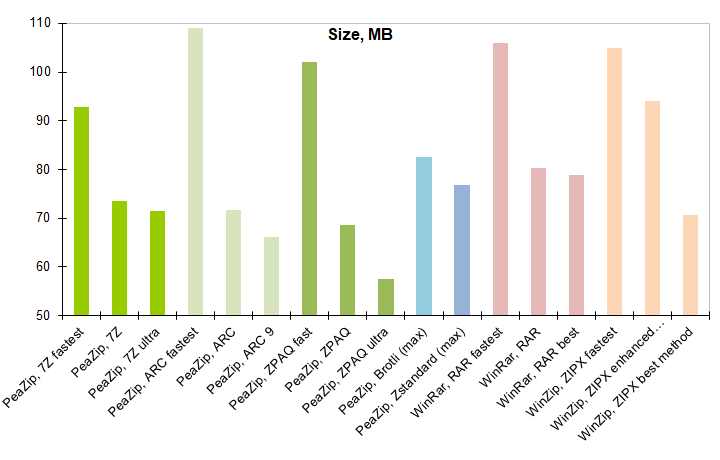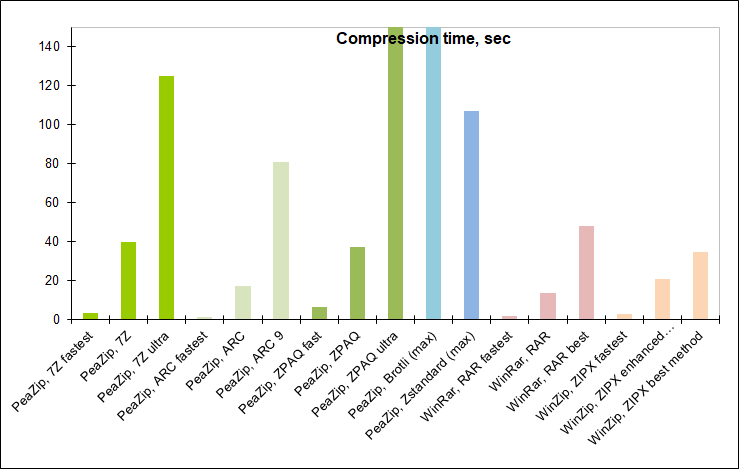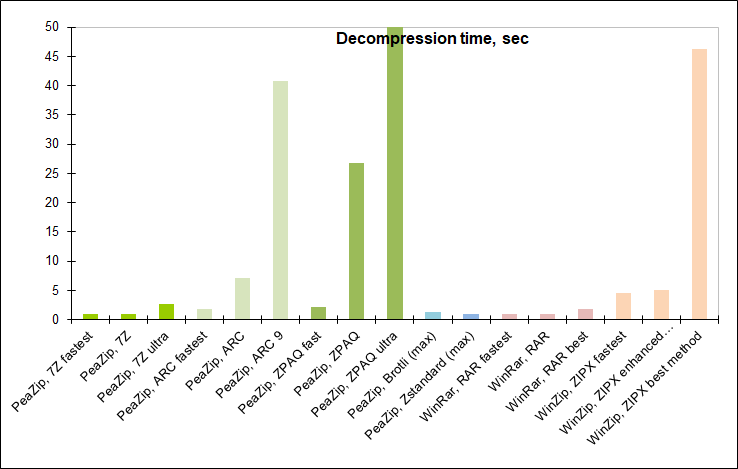Maximum file compression benchmark RAR versus 7Z ARC ZIPX (original) (raw)
| COMPRESSION BENCHMARK | | BROTLI VS ZSTANDARD | | MAXIMUM COMPRESSION | | FASTER THAN ZIP | | LARGE ARCHIVES | | ---------------------------------------------------------- | | ----------------------------------------------------------------------- | | --------------------------------------------------------- | | ----------------------------------------------------------------- | | --------------------------------------------------- |
- MAXIMUM COMPRESSION BENCHMARK SETTINGS
- MAX COMPRESSION / DECOMPRESSION PERFORMANCES TEST
- CONCLUSIONS: BEST FILE COMPRESSOR
Maximum compression benchmark settings
| Goals 1) Compare top compression formats 7Z, ARC, and ZPAQ (from PeaZip) with RAR (WinRar) and ZIPX (WinZip) in terms of maximum possible compression ratio. 2) Evaluate how each format scales in terms of compression ratio improvements versus compression and extraction speed reduction, with the increase of compression level. Software settings Benchmarks are conducted on Windows 10 2009 64 bit using 64 bit versions of: PeaZip 7.3.1 and 9.5.0 for Addendum section WinRar 5.8 WinZip 24 All applications are tested using default, out-of-the-box compression settings for the selected archive format.No cryptography option is set, since encryption impact on performances is out of the scope of this benchmark. Hardware settingsNotebook with Intel Core i7-8565U CPU, 4 physical cores with hyper-threading (8 logical cores), 8 GB RAMSystem disk 512 GB PCIe NVMe SSD, NTFS filesystemaaa | | Archive formats compared in this benchmark 7Z file format(7-Zip, 1999) Open Source archive format, widely used and well-known for excellent compression ratio, tested using default LZMA2 algorithm ARC file format(FreeArc, 2007) Open Source archive format designed aiming to superior compression. performances RAR file format(RarLabs, 1995) proprietary archive format quickly building reputation of being powerful compressor outperforming contemporary zip, bz2, and ace formats. Latest RAR5 format revision is being tested. ZIPX file format(WinZip, 2008) designed to improve compression ratio over ZIP with support for more compression algorithms. At minimum and default compression level Deflate algorithm is used, at maximum compression level WinZip tries to determine the most fit algorithm from supported ones, including BZip2, LZMA and PPMd. ZPAQ format (Matt Mahoney, 2009) Open Source archive format, computing intensive, providing very high compression ratio, supersedes previous PAQ format, multiple times Hutter Prize winner. ADDENDUM With PeaZip 9.5.0 BR and ZST compression formats were also tested, at maximum compression settings Brotli file format(Google, 2013) Open Source pure compression format developed for maximum compression and decompression speed, but very flexible and capable of also providing high compression ratio. Zstandard file format(Yann Collet, Przemysław Skibiński, Facebook, 2015) Open Source pure compression format, Zstd compressor was developed with same scope of Brotli, also very flexible and being capable of deliver high compression ratio in alternative to impressive compression speed. | | ---------------------------------------------------------------------------------------------------------------------------------------------------------------------------------------------------------------------------------------------------------------------------------------------------------------------------------------------------------------------------------------------------------------------------------------------------------------------------------------------------------------------------------------------------------------------------------------------------------------------------------------------------------------------------------------------------------------------------------------------------------------------------------------------------------------------------------------------------------------------------------------------------------------- | | ----------------------------------------------------------------------------------------------------------------------------------------------------------------------------------------------------------------------------------------------------------------------------------------------------------------------------------------------------------------------------------------------------------------------------------------------------------------------------------------------------------------------------------------------------------------------------------------------------------------------------------------------------------------------------------------------------------------------------------------------------------------------------------------------------------------------------------------------------------------------------------------------------------------------------------------------------------------------------------------------------------------------------------------------------------------------------------------------------------------------------------------------------------------------------------------------------------------------------------------------------------------------------------------------------------------------------------------------------------------------------------------------------------------------------------------------------------------------------------------------------------------------------------------------------------------------------------------------------------------------------------------------------------------------------------------------------------------------------------------------------------------------------------------------------------------------------------------------------------------------------------------------- |
Max compression / decompression performances test
Maximum compression benchmark methods
Benchmark input data is saved to system disk (PCIe SSD) and compressed to system disk, same partition, separate directory; the resulting archives are then extracted to separate directory on same (system) disk/partition.
Each compression and extraction test is repeated 10 times to get an average value; size is expressed in MB, time in seconds.
Each archive format is is tested with minimum (fastest non-store level), default, and maximum compression settings.
Default compression algorithm and default compression settings, as pre-set out of the box by file archivers being tested (PeaZip, WinRar, and WinZip), are employed for each format / level.
For Brotli and Zstandard compression, the input data was consolidated in a single TAR archive for running the benchmark
Maximum compression benchmark results table, the lower the better for all columns
| Utility, format, level | Compression SSD (sec) | Archive size (MB) | Compression ratio | ExtractionSSD (sec) |
|---|---|---|---|---|
| PeaZip, 7Z, fastest | 3.5 | 92.90 | 30.66% | 0.9 |
| PeaZip, 7Z, default | 39.6 | 73.60 | 24.29% | 1.0 |
| PeaZip, 7Z, ultra | 125.0 | 71.40 | 23.56% | 2.7 |
| PeaZip, ARC, 1 | 1.4 | 109.00 | 35.97% | 1.9 |
| PeaZip, ARC, 4 | 17.2 | 71.70 | 23.66% | 7.1 |
| PeaZip, ARC, 9 | 81.0 | 66.10 | 21.82% | 40.8 |
| PeaZip, ZPAQ, fast | 6.3 | 102.00 | 33.66% | 2.1 |
| PeaZip, ZPAQ, normal | 37.2 | 68.50 | 22.61% | 26.8 |
| PeaZip, ZPAQ, ultra | 354.0 | 57.60 | 19.01% | 356.0 |
| PeaZip, Brotli (max) | 190.0 | 82.60 | 27.26% | 1.3 |
| PeaZip Zstandard (max) | 107.0 | 76.80 | 25.335% | 1.0 |
| WinRar, RAR, fastest | 2.0 | 106.00 | 34.98% | 1.0 |
| WinRar, RAR, normal | 13.8 | 80.40 | 26.53% | 1.0 |
| WinRar, RAR, best | 48.0 | 78.90 | 26.04% | 1.8 |
| WinZip, ZIPX, fastest | 3.0 | 105.00 | 34.65% | 4.5 |
| WinZip, ZIPX, enhanced deflate | 21.0 | 94.00 | 31.02% | 5.0 |
| WinZip, ZIPX, best method | 34.7 | 70.70 | 23.33% | 46.2 |
Maximum compression ratio results
ZPAQ reached maximum compression ratio, compressing the 303.00 MB input down to 57.60 MB (19.01%), followed by ARC with output reduced to 66.10 MB. ZIPX and 7Z were able to reduce the input size to 70.70 MB and 71.40 MB respectively, and RAR scored the most poor compression performance with 78.90 MB output employing best compression setting.
All format shown a significant improvement in compression ratio switching from fastest to best compression settings, but for most formats most of the advantage emerged switching from fastest to default compression settings.
Especially, 7Z and RAR format shown very small improvements from default to ultra settings - which, as you can see in following chapter, comes at cost of much longer compression times.
The exception to this behavior is ZIPX format, providing a mediocre deflate based compression unless switching to alternate compression algorithms, with maximum compression, comparable to 7Z ultra, being attained using "best method" settings.
Even if usually associated with fast compression, both Brotli and Zstd compressors attained quite high compression ratios when used at maximum compression settings, with Zstandard being the best of the two and compressing slightly better than RAR at best compression level (and Brotli slighly worse).
Both, however, compressed less than 7Z at medium compression level.
Maximum compression speed results
Compression times increases for all format with the increase of compression settings, generally with best returns (in terms of compression ratio improvements) switching from fastest to default compression settings, and diminishing returns switching to ultra/best settings.
At maximum compression level, ZIPX is the fastest format, followed by RAR, ARC, and 7Z, ZPAQ being the slowest.
Using moderate compression settings, RAR and ARC emerge as the fastest formats.
Brotli suffered a noticeable performance penality when used at maximum compression level, being the second slowest compressor.
Zstandard too took a seizable performance hit, but overall remails noticeably faster than Brotly when both are used at maximum compression level,
Maximum compression extraction speed results
RAR and 7Z formats shows a clear advantage in terms of extraction speed compared to all other formats, with decompression times staying under 3 seconds even at higher compression levels.
ARC, ZIPX, and ZPAQ decompression speed increases significantly at high compression settings, with ARC being generally comparable or better in speed than ZIPX, and ZPAQ being the slowest.
It is noteworthy to point out that both Brotli and Zstandard excels in extraction speed even for archives created at maximum compression settings, and are amongst the fastest extractors in this benchmark, with a slight advantage for Zstd in terms of speed.
Conclusions: best file compressor
Best format for maximum possible compression ratio
ZPAQ is the winner in terms of maximum attainable compression, but is slower than other formats.
ZPAQ at maximum compression level reached a 19.01% compression ratio versus 21.82% reached by ARC at maximum compression level, the second best result of the benchmark.
Anyway, even ZPAQ at default level can compare favorably (in terms of compression ratio versus speed tradeoff) with other formats at best compression settings - only ARC at highest level surpassing its compression ratio - with a 10x speed advantage of ZPAQ default vs ZPAQ ultra.
For all formats excluding ZIPX, average compression settings represented an optimal tradeoff between compression ratio and compression speed, with diminishing returns for switching to highest compression levels.
For all format each compression level increase represented an higher computational cost (with longer compression times), for smaller improvements in compression ratio.
For this reason it can be recommended to use other methods than increasing compression level to keep the output below a desired threshold, in example spanning the outpput to multiple volumes of fixed size in order to meet maximum size constrains, or deduplicate input data before compression.
This is even more true when compressing data sets containing multimedia, or encrypted files, which generally does not compress well, or does not compress at all regardless employed algorithm/settings.
Unlike compression speed, which generally scaled uniformly with increasing of compression level, extraction speed was more correlated with the archive format nature, with 7Z and RAR decompression times remain fast (well below 3 seconds) at any compression level.
Benchmark conclusions in brief:
What is the most powerful file compressor?
ZPAQ is clearly the top performing format in this benchmark focused on maximum attainable compression.
What is the overall best compression format?
It depends on user's need, with compression ratio being only one factor of the equation.
ZPAQ and ARC are the best compressors, but 7Z and RAR formats has a clear advantage in terms of decompression speed, faster than for any other tested format.
7Z vs RAR, which is the best compressor?
7Z outperformed RAR in terms of compression ratio at all compression levels, but RAR outperformed 7Z in terms of compression speed.
Extraction speed is quite similar, and keeps reasonable for both formats at all compression levels.Are Brotli and Zstandard suited for max compression?
Brotli and Zstd can provide surprisingly good compression ratios, even if they are designed primarily for fast compression tasks, with Zstandard being overall the best choice.
It must be noted the performance penality is very relevant in terms of compression speed, with traditional compression formats like 7Z and RAR being more fit for this task.
However, decompression speed remains very high even extracting BR and ZST files compressed at maximum settings.
Is it worth to set best / maximum / ultra compression settings?
Increasing compression level decreases performances with diminishing returns. File spanning and data deduplication are recomended in alternative to higher compression settings, and solid compression option is a must to attain highest compression ratio when multiple similar files are involved - even if single files are not compressible (in the traditional sense) taken one by one.
Read more about how to create 7Z files, or alternatively how to create ARC files, or how to create PAQ / ZPAQ files if maximum compression is needed. Please note PeaZip is also capable to create RAR files if WinRar is installed in the system, and to create ZIPX files following the new WinZip standard (even if not all allowed algorithms are yet supported).
Synopsis: Maximum file compression benchmark. 7Z, ARC, ZIPX versus RAR comparison for best, most powerful compressor format. What algorithm compresses the most. What archive format reach highest compression ratio. Which file archiver utility compresses better. What are the best compression options and settings.
Topics: maximum compression benchmark, best file compressor, best archive format for max compression, 7z vs rar vs zpaq
PeaZip > Compression benchmark > Maximum compression benchmark: 7z, arc, zpaq vs rar, zipx


